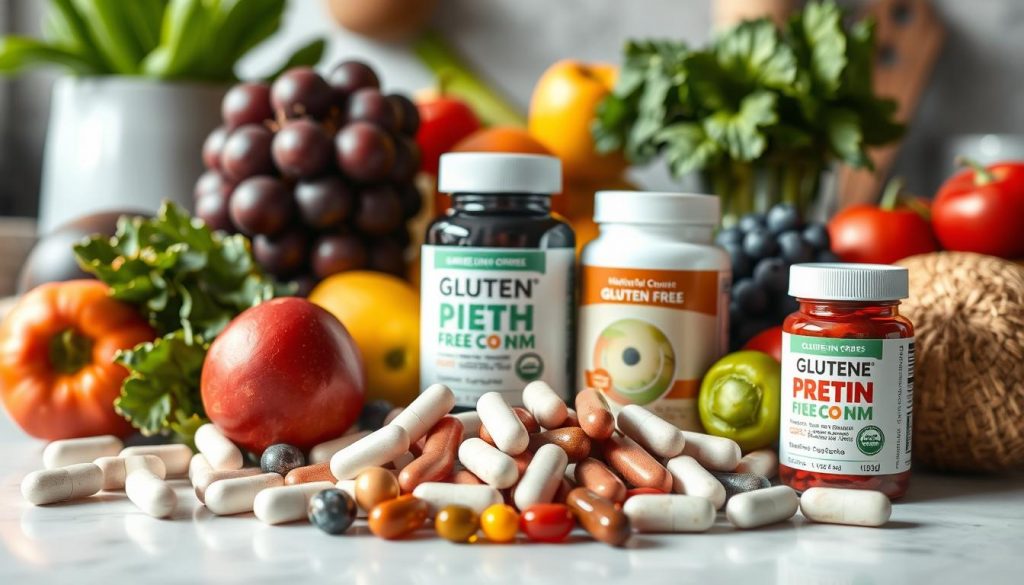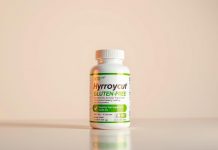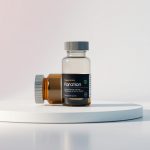Are you finding it hard to lose weight on a gluten-free diet? You’re not alone. Finding the right gluten-free diet pills can be tough. But, with the right ones, you can reach your weight loss goals without harming your health. This guide will help you find the best gluten-free weight loss supplements for your needs.
Table of Contents
Key Takeaways
- Gluten-free diet pills are for people with celiac disease, gluten sensitivity, or who follow a gluten-free diet.
- These supplements help with weight management without gluten.
- They offer a solution for those trying to lose weight while sticking to dietary rules.
- Gluten-free flours include rice, soy, corn, potato, and bean flours1.
- Naturally gluten-free foods are fruits, vegetables, nuts, lean meats, and most dairy products1.
Understanding Gluten-Free Weight Loss Supplements
Finding the right weight loss supplements can be hard, even more so for those with gluten issues. Gluten-free supplements don’t have wheat, barley, or rye. They use things like rice flour or corn starch instead2.
What Makes a Diet Pill Gluten-Free?
A weight loss pill is gluten-free if it doesn’t have wheat, barley, or rye. This means no gluten in binders, fillers, or coatings. Companies use gluten-free ingredients to do the same job2.
Benefits of Gluten-Free Supplementation
People with gluten sensitivities can benefit from gluten-free supplements. They help reduce inflammation and improve digestion. This makes it easier to manage weight and stay healthy2. Plus, a gluten-free diet might lower the risk of heart disease and other serious health issues2.
Key Certifications to Look For
When looking for gluten-free supplements, check for the “Certified Gluten-Free” label. Look for it from groups like the Gluten Intolerance Group or the Celiac Support Association. These labels mean the product is very pure and gluten-free3.
Knowing about gluten-free supplements helps those with gluten sensitivities make better choices. This supports their health and wellness goals23.
Top Gluten-Free Diet Pills for 2024
For those managing their weight on a gluten-free diet, many effective diet pills are available. Brands like Irwin Naturals lead with non-GMO, gluten-free formulas4. These formulas use plant extracts, vitamins, and minerals to help with weight loss.
Sports Research L-Theanine is a budget-friendly option at $0.33 per serving4. On the other hand, hormone-based supplements like Hims Weight Loss and Hers Weight Loss cost $199 per month4.
It’s important to pick a gluten-free diet pill that’s clearly labeled as such.
| Supplement | Key Ingredients | Cost per Serving | Suggested Use |
|---|---|---|---|
| PhenQ | Capsaicin, Chromium Picolinate, Caffeine | $2.33 | 1-2 capsules per day |
| Sports Research L-Theanine | L-Theanine | $0.33 | 1 serving per day |
| Transparent Labs Recomp | L-Carnitine Fumarate, Nopal Cactus | $0.92 | 2-4 capsules per day |
| Legion Forge | Caffeine, L-Theanine, Apple Cider Vinegar | $1.11 | 1-2 servings per day |
| Promix Unflavored Collagen Peptides | Hydrolyzed Collagen Peptides | $1.31 | 1-2 scoops per day |
| Kaged Clean Burn Elite | Chromium, Green Tea Extract, Cayenne Pepper | $1.67 | 2 capsules per day |
| Hunter Burn | Cayenne Pepper, Kelp, Vitamin B6 | $3.00 | 6 capsules per day |
| Hourglass Fit | Glucomannan, Chromium, Vitamin B6 | $2.00 | 4 capsules per day |
These gluten-free diet pills use ingredients like capsaicin and chromium picolinate4. They come in capsules, softgels, and powders. The daily intake varies from 1 to 6 servings4.
“Gluten is found in wheat, barley, and rye, with corn, rice, potatoes, and legumes being gluten-free alternatives.”5
Choosing gluten-free weight loss supplements is key to meeting dietary needs5. By using these gluten-free diet pills, you can manage your weight while staying gluten-free.
Natural Ingredients in Gluten-Free Weight Management Solutions
Natural ingredients are key in gluten-free weight management. They use plant-based parts, minerals, vitamins, and herbal extracts. These help with weight loss without gluten.
Plant-Based Components
Supplements often include quinoa, brown rice, and buckwheat. These plants are full of nutrients like carbs, fiber, and vitamins. They help make a diet balanced and filling6.
Mineral and Vitamin Additions
Minerals and vitamins are added to boost nutrition. B-complex vitamins support energy, and magnesium and zinc help with body functions6.
Herbal Extracts and Their Benefits
Herbal extracts like green tea, garcinia cambogia, and forskolin are used. They may boost metabolism and fat burning7.
By mixing plants, nutrients, and herbs, these solutions aim to help with weight loss. They meet the dietary needs of those with gluten issues.
How Gluten-Free Diet Pills Support Weight Loss
For those with celiac disease or gluten sensitivity, gluten-free diet pills can be a big help. These supplements are made to tackle the special challenges of a gluten-free diet. They help reduce inflammation and bloating, improving digestion and nutrient absorption8.
Many of these pills also have ingredients that boost metabolism and burn fat. This is great for those who find it hard to lose weight on a gluten-free diet. The mix of ingredients in these supplements can help you lose weight in a healthy way9.
Some gluten-free diet pills also have fiber to help you feel full and digest better. This is good for those who often feel hungry or uncomfortable on a gluten-free diet. These supplements can help you manage your weight and stay healthy8.
| Ingredient | Benefits |
|---|---|
| Chromium | Supports healthy blood sugar levels and metabolism |
| Green Tea Extract | Contains antioxidants and compounds that may boost fat burning |
| Glucomannan | A soluble fiber that can promote feelings of fullness |
| Cayenne Pepper | May increase metabolism and thermogenesis |
Adding gluten-free diet pills to your weight loss plan can be a smart move. They help those with celiac disease or gluten sensitivity reach their health goals. These supplements offer a natural way to boost metabolism and improve overall well-being9.
Safety Considerations and Possible Side Effects
It’s important to know about the side effects and safety of gluten-free diet pills. Only a small percentage of people in the U.S. have gluten-related diseases like celiac disease10. But, more people are choosing to follow a gluten-free diet, even if they don’t have to10. This shows we need to understand the safety and side effects of these supplements.
Common Side Effects
Side effects of gluten-free diet pills can include nausea, diarrhea, or headaches. These can differ based on how sensitive someone is and what’s in the supplement. Always check the label and talk to a doctor before starting any new supplement.
Contraindications and Warnings
Some people should be careful with gluten-free diet pills. Many adults in the U.S. are trying to avoid gluten, even if they don’t have to11. Pregnant women, people with certain health issues, or those on specific medications should be cautious. It’s best to talk to a doctor before using these supplements.
Recommended Dosage Guidelines
It’s key to follow the dosage guidelines on the label of gluten-free diet pills. Taking more than suggested can lead to bad side effects and won’t help more. Stick to the recommended amounts and how often to use them for safe and effective results.
Understanding the safety and side effects of gluten-free diet pills is vital. Knowing the common side effects, who should avoid them, and how to use them right helps make smart choices. This way, we can focus on our health and well-being when using these supplements.
Comparing Celiac-Friendly Weight Loss Options
For those with celiac disease or gluten sensitivity, there are many options for weight management. This includes celiac diet pills, wheat-free appetite suppressants, and gluten-free weight loss supplements12. People with celiac disease must stick to a gluten-free diet to avoid intestinal damage12. But, research suggests that a gluten-free diet might also help non-celiac individuals lose weight, possibly because it encourages healthier eating12.
Yet, gluten-free foods often lack important nutrients like fiber and vitamins found in gluten-containing foods12. Processed gluten-free foods can also be high in unhealthy fats and sugars, leading to weight gain12. It’s wise to talk to a healthcare provider and nutritionist before starting a gluten-free weight loss plan12.
When looking at celiac-friendly weight loss options, think about the quality of ingredients, certifications, and your weight loss goals12. Some supplements aim to suppress appetite, while others focus on burning fat or boosting metabolism12. Different products offer various benefits, such as increased energy or better digestion, in addition to weight loss12.
The gluten-free market has grown a lot, with sales expected to hit $6.6 billion by 201713. This growth is due to more people seeing gluten-free products as healthier and wanting them for weight loss13.
But, it’s key to remember that celiac disease is more common in those with type 1 diabetes. Many adults and children avoid gluten without having celiac disease13. Also, gluten-free products are usually pricier than their gluten-containing counterparts13.
By weighing these points and getting advice from healthcare professionals, those with celiac disease or gluten sensitivity can choose the best celiac diet pills, wheat-free appetite suppressants, and gluten-free weight loss supplements for their needs and goals.

Integrating Diet Pills with a Gluten-Free Lifestyle
Managing weight while following a gluten-free diet can be tricky. But, with the right steps, you can easily add gluten-free diet pills to your routine14. About 1% of people worldwide have celiac disease, needing a strict gluten-free diet14. Also, 6% of kids might have gluten-related problems, showing why early detection and right management are key14.
Meal Planning Tips
Start with whole, unprocessed foods that don’t have gluten. This means lots of fresh fruits, veggies, lean proteins, and gluten-free grains like quinoa and brown rice15. Celiac disease can make it hard to absorb nutrients, so choose foods rich in nutrients to help your body15.
Exercise Recommendations
Being active is vital for a healthy gluten-free life. Try to do at least 30 minutes of moderate exercise daily, like walking, swimming, or cycling15. Adding strength training can also help with weight control and overall health15.
Using gluten-free diet pills with a balanced diet and exercise can boost your weight loss and health14. The gluten-free market is growing fast, with a 9.2% annual growth rate from 2021 to 202814.
“Integrating a gluten-free lifestyle with weight management can be a transformative journey, but it requires a holistic approach that considers both nutrition and physical activity.”
Non-GMO and Allergen-Free Certification Standards
Choosing the right non-GMO slimming aids and allergy-friendly diet capsules is key. Certification standards are vital. They ensure products are free from GMOs and common allergens like gluten16.
The Non-GMO Project and the Gluten-Free Certification Organization (GFCO) are leaders in this field. They have strict testing and auditing. This verifies products are safe for those with dietary restrictions or preferences16.
The FDA has rules for gluten-free labeling. Products must have less than 20 ppm of gluten17. This rule helps us find true gluten-free options, even in foods and drinks that have been processed17.
By picking non-GMO slimming aids and allergy-friendly diet capsules with these certifications, we support our health. We also meet our dietary needs1617.

In the world of weight management supplements, our well-being is top priority. It’s important to choose products that fit our needs. Understanding non-GMO and allergen-free certifications helps us make better choices. We can enjoy the benefits of a gluten-free lifestyle1617.
Metabolism Boosters and Fat Burners: What to Look For
When searching for natural gluten-free fat burners and grain-free metabolism boosters, look for green tea extract, caffeine, L-carnitine, and chromium18. These ingredients may help with weight loss and boost metabolism, based on studies18. But remember, everyone’s body reacts differently, so be cautious of any side effects or interactions with other health products.
Key Active Ingredients
Green tea extract is a favorite in many fat burners because it may increase fat burning and thermogenesis18. Caffeine is also common, as it can give you energy and help break down fat cells18. L-carnitine, a natural amino acid, helps move fatty acids into the mitochondria for energy18. Chromium, a trace mineral, aids in fat and sugar metabolism, which can help manage blood sugar and weight.
Effectiveness Studies
Studies have looked into how these ingredients help with weight loss and metabolism. For example, green tea extract might slightly increase energy use and fat burning18. L-carnitine might also help reduce body weight and fat18. But, results can vary, and it depends on the person and the supplement.
When picking a gluten-free metabolism booster or fat burner, choose products with ingredients backed by science and clear labels18. This ensures you’re getting a supplement that could help with weight management and fits your dietary and health needs.
Customer Reviews and Success Stories
Customer reviews and success stories are key when it comes to gluten-free diet pills. They show how these products work in real life19. Many people say they’ve lost weight, feel more energetic, and have better digestion19. They also talk about how important it is to eat well and exercise regularly19.
Erin, for example, noticed big health improvements after going gluten-free. She felt more energetic, lost weight, and her hair got healthier19. She didn’t find it hard to make the change because she saw how it made her feel better right away19.
On the other hand, Anne Hoyt found it tough to eat out because of her dietary needs. She missed the social part of eating19.
It’s important to remember that everyone’s experience with gluten-free diet pills is different. You should look at reviews carefully, thinking about your own lifestyle and health20. Some products, like PhenQ and Phen24, help with weight loss at different times of the day20.
Many people have had great results with weight loss apps. They help track food and support weight loss21. For example, one person lost 35 pounds in 4 months, and another lost 20 pounds in 2 months21. These stories show how helpful apps can be in managing weight and following a gluten-free diet21.
Conclusion
Gluten-free weight loss supplements are a great option for those on a gluten-free diet or with celiac disease. They work well when paired with a healthy diet and exercise. This combo helps us reach our weight loss goals and stay healthy22.
Choosing the right gluten-free diet pills is key. Look for products with good certifications, natural ingredients, and proven results. This way, we make choices that fit our health needs22. It’s also smart to talk to a doctor before starting any supplements22.
The need for gluten-free products is on the rise, thanks to more people learning about gluten intolerance23. These supplements help those with gluten sensitivity stay healthy on a gluten-free diet23. Adding them to our daily routine can boost energy, improve digestion, strengthen the immune system, and enhance our overall health23.
FAQ
What are gluten-free diet pills?
What makes a diet pill gluten-free?
What are the benefits of gluten-free supplementation?
What certifications should I look for in gluten-free diet pills?
What are some popular gluten-free diet pill brands?
What natural ingredients are commonly found in gluten-free weight management solutions?
How do gluten-free diet pills support weight loss?
What are the possible side effects and contraindications of gluten-free diet pills?
How do I compare celiac-friendly weight loss options?
How can I integrate gluten-free diet pills with a healthy lifestyle?
What do non-GMO and allergen-free certifications mean for gluten-free diet pills?
What key active ingredients should I look for in gluten-free metabolism boosters and fat burners?
What do customer reviews and success stories say about gluten-free diet pills?
Source Links
- The good news is that you don’t have to go grain-free. – https://www.mayoclinic.org/healthy-lifestyle/nutrition-and-healthy-eating/in-depth/gluten-free-diet/art-20048530
- Diet Review: Gluten-Free for Weight Loss – https://nutritionsource.hsph.harvard.edu/healthy-weight/diet-reviews/gluten-free-diet-weight-loss/
- A Beginner’s Guide to a Gluten-Free Diet – https://www.healthline.com/nutrition/gluten-free-diet
- 10 best supplements for weight loss 2024, expert reviewed | Fortune Recommends – https://fortune.com/recommends/health/best-supplements-for-weight-loss/
- Gluten Free Medical Weight Loss Products – https://www.ambarinutrition.com/collections/gluten-free-medical-weight-loss-foods?srsltid=AfmBOoqaqA5RES_Ci9jpRoGxAX0ZzTwndE0rxGH4OUZezSySKOiXciK7
- Not All Supplements Are Gluten-Free—But These RD-Trusted Options Are – https://www.verywellhealth.com/best-gluten-free-vitamin-brands-8641345
- METABOLISM FOR HER Weight, Cravings, & Fat Burn Support – https://store.eunatural.com/products/metabolism-for-her
- The Surprising Truth About Gluten-Free Food and Weight Loss – https://health.clevelandclinic.org/the-surprising-truth-about-gluten-free-food-and-weight-loss
- Office of Dietary Supplements – Dietary Supplements for Weight Loss – https://ods.od.nih.gov/factsheets/WeightLoss-HealthProfessional/
- Health Benefits and Adverse Effects of a Gluten-Free Diet in Non–Celiac Disease Patients – https://www.ncbi.nlm.nih.gov/pmc/articles/PMC5866307/
- Gluten-free diet: Health benefits, risks, and foods – https://www.medicalnewstoday.com/articles/288406
- Find out How a Gluten-Free Diet Can Help You With Weight Loss – https://www.verywellhealth.com/gluten-free-weight-loss-563074
- The Gluten-Free Diet: Fad or Necessity? – https://www.ncbi.nlm.nih.gov/pmc/articles/PMC5439366/
- Gluten Free Diet Support & Guidance | Laura Cipullo – https://lauracipullo.com/gluten-free-diet-plan/
- The Gluten-Free Diet for Celiac Disease and Beyond – https://www.ncbi.nlm.nih.gov/pmc/articles/PMC8625243/
- Questions and Answers on the Gluten-Free Food Labeling Final Rule – https://www.fda.gov/food/nutrition-food-labeling-and-critical-foods/questions-and-answers-gluten-free-food-labeling-final-rule
- Gluten and Food Labeling – https://www.fda.gov/food/nutrition-education-resources-materials/gluten-and-food-labeling
- The 5 best fat burner supplements, according to a nutritionist | Fortune Recommends Health – https://fortune.com/recommends/health/best-fat-burners/
- Gluten free-dom: my journey to becoming an unintentional expert – https://pmc.ncbi.nlm.nih.gov/articles/PMC4059589/
- Best Weight Loss Supplements of 2024: 11 Products That Work – https://www.jpost.com/health-and-wellness/supplements/best-weight-loss-supplements-of-2024-11-products-that-work-819158
- User Reviews – MyNetDiary – https://www.mynetdiary.com/user-reviews.html
- Celiac disease patients warned about dietary supplements | BeyondCeliac.org – https://www.beyondceliac.org/research-news/celiac-disease-patients-warned-about-dietary-supplements/
- The Essential Role of Gluten-Free Supplements in Supporting Gluten Intolerance – https://powerbynaturals.com/blogs/news/the-essential-role-of-gluten-free-supplements-in-supporting-gluten-intolerance?srsltid=AfmBOopLgjILR9VARJY4fFc7aQMjyOnDt4L-YN5RMc-QQZe2kI1VHloE












